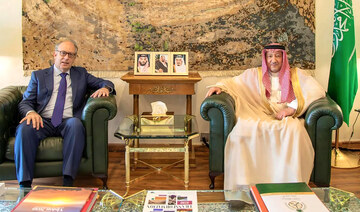RIYADH: As he prepared to say a fond farewell to Saudi Arabia, Jorge Sierra, Spain’s ambassador to the Kingdom, reflected on some of his most cherished memories and shared his perspective on Saudi-Spanish relations.
“It’s been a wonderful experience to know such a beautiful country with such a strong personality, at a moment of social and economic changes that is fascinating to see. There are so many things going on here,” he said.
Sierra was appointed ambassador on Oct. 21, 2021, and arrived in the Kingdom the following month. In an interview with Arab News, he said was already somewhat familiar with Saudi Arabia thanks to conversations with his predecessors and a visit to the country in 2002, and shared some of his fondest memories of working there.
“My most memorable experience, without any doubt, was going to the Empty Quarter; it was amazing,” he said.
“We were a group of 12 and we went with a group of professionals that specialize in that particular kind of tourism. We went for three days and it was great. It was fascinating. I am so happy that I did it.”
Another of his highlights was the ancient city of AlUla, which he said he visited several times.
On the day-to-day business of diplomacy, Sierra said bilateral relations are “excellent” and both countries are “satisfied on a political level.”

Jorge Sierra, Spain’s ambassador to the Kingdom, reflected on some of his most cherished memories and shared his perspective on Saudi-Spanish relations. (Huda Bashatah)
Thanks to exchange visits and ministerial efforts on both sides “trade is in a good position” and “cultural ties are also strong,” he added, but work continues to enhance the relationship even further: “We always think that we can do more. We want more.”
As for what the future might hold for cooperation between the countries, he said: “The future is bright in our bilateral relations. We are working on creating a structure that allows us to upgrade our relations to a strategic level.”
In his role as ambassador over the past three-and-a-half years, Sierra played a significant part in the development of relations between the countries in various fields. But are there any moments he looks back on with particular fondness?
“There is one that I will never forget,” he said. “In the cultural field we organized, in October 2023, a concert with a very famous Spanish musician.”
The musician was Jose Hevia, a renowned Spanish bagpiper, and the concert was a collaboration between the Spanish Embassy, the Saudi Ministry of Culture’s Music Commission, and the Royal Commission for Riyadh City.
“He played with a Saudi musician who played traditional instruments. It was at the Cultural Palace,” he said, adding that there was not a single empty seat in the 600-capacity venue. “I will always remember (it).”
Sierra also noted the political changes that have been taking place in the Kingdom and said: “Saudi Arabia is becoming sort of a world hub of diplomacy.”
His time as ambassador will officially end on March 25, when he will return to Madrid to embark on a new challenge in international law department of Spain’s Foreign Ministry. He said he was looking forward to this new role, which will have a particular focus on humanitarian law, because private and public international law was his favorite subject at university and now he has the chance to work in that field.
“I am so happy because I will pay a debt that I have with myself; I will have the chance to be and work in a field I am really interested in,” he said.
As the Saudi chapter of his career comes to an end, Sierra thanked his team at the embassy, including his counselors in economics and cultural affairs and other topics, for their help spearheading programs designed to advance Saudi-Spanish ties.
His successor as ambassador to Saudi Arabia will be Javier Carbajosa Sanchez, who previously served as Spain’s envoy to Qatar.



































